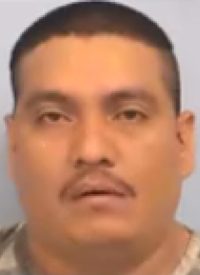
Austin, Texas, was the scene of another case of human trafficking over the weekend. Police arrested 39-year-old Felix Lugo Medina (picture, left) on Friday night in a southside apartment complex and charged him with kidnapping a man from Nuevo Laredo (across the international border — the Rio Grande River — from Laredo, Texas), according to KVUE.com, Austin’s ABC affiliate.
Medina is reported to have told the kidnapped man’s family that the victim would be killed by members of the Mexican Zeta drug cartel unless they paid a ransom. After the family paid $800, Medina demanded another $3,400. KVUE’s report on the case was sparse, as few details are available.
During the sting operation in which Medina was arrested, police discovered seven other people being held in the same apartment. Those cases remain under investigation. One resident in the complex resolved to move immediately to escape the danger, saying crimes in the city are becoming more frequent and violent.
Laredo/Nuevo Laredo is the site of the busy international border crossing where I-35 enters Mexico. Readers will remember that the heavily promoted Trans Texas Corridor, criticized for the opportunities it provides for drug trafficking, follows the I-35 corridor.
This was not the first case of human trafficking in central Texas. Last July, three Guatemalans were held hostage in the nearby small town of Elgin by four men who had smuggled them into the country. The four had called the men’s families in Guatemala demanding ransom when one of the victims escaped and went for help. Authorities then learned that 10 additional illegal immigrants had been living in the same house, but had been removed to an unknown location.
In a similar case in 2009, two dozen illegal immigrants from El Salvador and Honduras were discovered being held in Bastrop, only 20 minutes from Elgin. That case was followed a month later by the breakup of a trafficking ring in Austin which resulted in the arrest of a man who had beaten and tortured his victims for ransom.
In this newest kidnapping case, it is not known if Medina is actually a Zeta cartel member or was just using the same method of extortion as the drug gangs. The cartels frequently bring illegals into the United States and then refuse to release them until ransom is paid; additionally, they often simply kidnap people with the same goal. Last August, the 72 people found massacred in northern Mexico are believed to have been victims of a similar extortion scheme.
The cartels hold no allegiance to either their fellow nationals or the residents of U.S. border cities who are endangered by their trafficking rings. As if the problems of illegal immigration -— among which are the threat to national security and an already-overburdened welfare system -— were not enough, now the increasing instances of human trafficking are escalating the demands of U.S. border-state residents that border security be immediately enforced.
Austin, Texas, is one of the notorious “sanctuary cities” in the country that follow certain practices to protect illegal aliens. However, as yet there is no sanctuary for the innocent victims of the Mexican drug cartels that are fueling their financial engines with ransom and extortion money.



